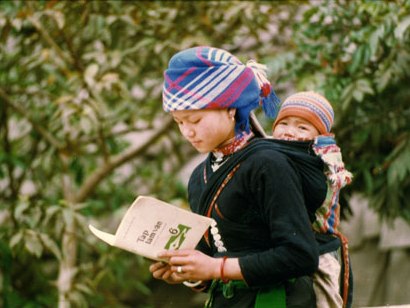
[10 May 2013] -Spotting a group of young ethnic women relaxing under the shade of their stilt-houses during a recent trip to the northwestern Dien Bien and Son La provinces, we stopped the car to offer some clothes from charity.
The women and the children were not so surprised that we were visiting them. One woman received pants for her child but continued to let the boy run around partly unclothed.

The women, it seemed, were used to receiving charity drops from random travelers, who took a few photos out of curiosity, and left.
For many, waiting around for visitors seemed part of their routine.
At most conferences tackling development, international partners often praise Viet Nam for its remarkable progress in poverty reduction. Statistics prove it. According to the World Bank, an estimated 30 million Vietnamese people have been lifted out of poverty in the past 20 years.
The Ministry of Labour, Invalids and Social Affairs estimated the number of poor households dropped from 14.2 per cent in 2010 to 9.6 per cent in 2012. But that number remained high at 43.89 per cent in the 62 poorest districts.
It is true that lives have been bettered, even for the poorest. The isolation once separating mountain residents from lowlanders has been bridged by new jobs, roads, schools and markets. Technology and entertainment are no longer the preserve of urban dwellers.
The land, mountains and forests where most of the 12.3 million ethnic people live contain vital natural resources, and act as barriers to floods, erosion and protection to climate change effects. Most importantly, they provide natural border obstacles, protecting Vietnamese security.
So even when the State budget is tight, the Government allocated VND54.77 trillion (US$2.6 billion) for development programmes for ethnic and mountainous localities. This has been spent on building basic infrastructure, housing, water supplies, lending facilities, resettlement and vocational training.
However, as Deputy Prime Minister Vu Van Ninh agreed in a national teleconference earlier this month, many of our poverty reduction efforts have been unsustainable. Programmes must enable residents to be proactive in getting out of poverty, he stressed.
Ninh said local authorities needed to differentiate between groups that needed "the fishing rod" and those that still needed the "fish". Without learning how to fish, residents of one poor ethnic commune in the Central Highlands ended up buying new cars with compensation money for farm-land taken by hydro-power works.
According to Nghe An Province Department of Education and Training, more than 11,560 college-level graduates could not find jobs at the beginning of 2013, especially in the province's mountainous districts such as Ky Son, Tuong Duong and Quynh Chau. Vocational training and educational opportunities had been expanded for ethnic youth but many still looked toward the cities for opportunities.
For 25 years, Viet Nam has been a rice exporter but last year we imported more than 1.6 million tonnes of corn, nearly 1.3 million tonnes of soybeans and nearly $841 million in milk-related products, according to the Food and Agriculture Organisation of the UN.
This was due to the rising demand for input materials to produce cattle food and the low productivity of farmers. Notably many ethnic farmers rely on growing corn. Much has been invested into rice technologies but not for corn and other plants that can help bring the ethnic people out of poverty.
Residents displaced by hydropower projects can receive the equivalent of $4,000-$5,000 in compensation, but lacked awareness of how to spend it wisely. In several resettlement localities in Son La and Dien Bien provinces, residents say they needed more support to raise cattle and find ways to generate a stable income on a smaller amount of land.
So in the next phrase of poverty reduction, we need to put the people more at the centre of policies. We need to add more jobs, not just roads, educational opportunities; not just schools and support in expanding production; not just handing out compensation money.
What's more, we need to get the ethnic people themselves totally involved in creating new lives. The State money can't be taken for granted.
Because eventually the fish will be gone. — VNS
 State looks for an SOE sea change (09/03/2013)
State looks for an SOE sea change (09/03/2013)
 Economic reality bites into society (08/03/2013)
Economic reality bites into society (08/03/2013)
 Vietnam deputy PM says 30 pct of public servants ineffective (14/02/2013)
Vietnam deputy PM says 30 pct of public servants ineffective (14/02/2013)
 Gov’t announces solutions for socio-economic development in 2013 (12/01/2013)
Gov’t announces solutions for socio-economic development in 2013 (12/01/2013)
 Vietnam to remain manufacturing hotspot (02/12/2012)
Vietnam to remain manufacturing hotspot (02/12/2012)
 Expert downgrades VN 2012 economic outlook (25/11/2012)
Expert downgrades VN 2012 economic outlook (25/11/2012)
 VN business environment lags behind region (26/10/2012)
VN business environment lags behind region (26/10/2012)
 Agricultural export – a bright spot in a struggling economy (07/10/2012)
Agricultural export – a bright spot in a struggling economy (07/10/2012)
 Government discusses reforming SOEs (09/09/2012)
Government discusses reforming SOEs (09/09/2012)
 Business closures pass 26,000 (06/08/2012)
Business closures pass 26,000 (06/08/2012)